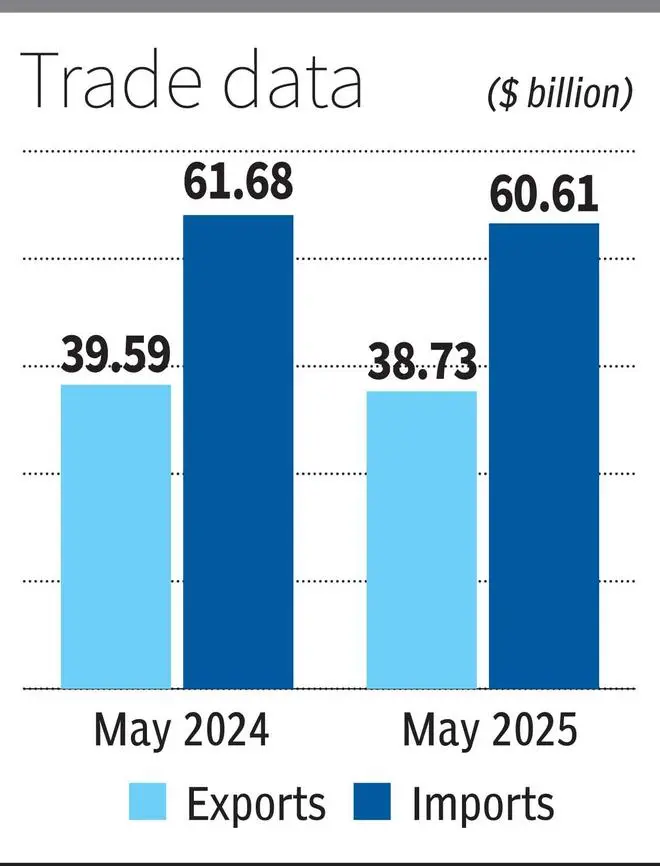
The US remained the top export destination for India with shipments in May 2025 increasing 16.93 per cent to $8.83 billion. | Photo Credit: Tryaging
India’s goods exports contracted 2.17 per cent (year-on-year) in May to $38.73 billion, following two consecutive months of growth, with sectors including petroleum products, gems & jewellery and engineering posting a decline.
Trade deficit narrowed to $21.88 billion in May 2025, compared to $22.09 billion in May last year, as imports fell 1.7 per cent (year-on-year) to $60.61 billion. Petroleum products, gold and coal & coke contributed significantly to the fall in imports, per data released by the Commerce & Industry Ministry on Monday.

Some exporters are apprehensive that the increasing geopolitical tensions, especially the Israel-Iran conflict, may have an adverse effect on trade going forward and there was a need for caution.
During April-May, exports increased 3.11 per cent to $77.19 billion, while imports grew 8 per cent to $125.52 billion.
“Despite the global policy uncertainty regarding trade and ongoing conflicts, we have done extremely well in the April-May period)...If you look at the forecast of the WTO, we are doing better than global average,” Commerce Secretary Sunil Barthwal said at a media briefing on Monday.
Barthwal said that dip in crude oil prices in the last two months that had a dampening impact on exports.
The US remained the top export destination for India with shipments in May increasing 16.93 per cent to $8.83 billion. The increase may be partly attributed to efforts put in by exporters to send their shipments before July 9 when the 90-day pause period on the US reciprocal tariffs end. The UAE, the Netherlands, China and Singapore were among the top five export destinations.
China was the top import source for India in May with imports rising 21.61 per cent to $10.31 billion. Imports from the UAE increased 27.64 per cent during the month to $6.35 billion. Russia, the US and Iraq were among the top five import sources but imports from these countries were lower than in May 2024.
Indian exporters’ ability to sustain export growth despite logistical disruptions, especially in the Middle East, is a testament to the sector’s agility and policy support, pointed out S C Ralhan, President, Federation of Indian Export Organisations (FIEO).
However, the mounting geopolitical tensions in key parts of the world wad adding to uncertainty, according to Pankaj Chadha, Chairman, EEPC India.
“The latest Israel-Iran conflict threatens to multiply the challenges for the exporting community. Apart from rise in input costs as a result of jump in crude prices, there is heightened concern around blocking of Straits of Hormuz by Iran in case tensions further intensify. In that case, logistics cost could surge significantly,” Chadha said.
Published on June 16, 2025

Comments
Comments have to be in English, and in full sentences. They cannot be abusive or personal. Please abide by our community guidelines for posting your comments.
We have migrated to a new commenting platform. If you are already a registered user of TheHindu Businessline and logged in, you may continue to engage with our articles. If you do not have an account please register and login to post comments. Users can access their older comments by logging into their accounts on Vuukle.